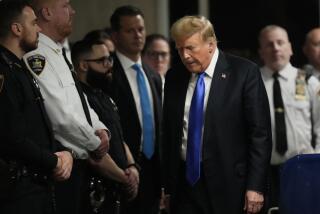PERSPECTIVES ON CRIMINAL JUSTICE : The Unanimous Verdict Is Essential for Fairness : If split verdicts are allowed, dissenting arguments won’t get a full airing and charges of racism will abound.
- Share via
The circus-like trial of O.J. Simpson has featured many cynical and transparent detours from the search for truth--all of which underscores the wisdom of requiring jury verdicts to be unanimous.
Unanimous verdicts are a cornerstone of public confidence in the judicial system. When that confidence is shaken, as in the acquittals of LAPD officers accused of beating Rodney King, the immediate consequences are ugly and the future is haunted by community bitterness.
Jury unanimity is especially essential in the trial of celebrity figures like O.J. Simpson, where public perceptions of the prosecution sharply break along racial lines and the jury is racially diverse. Thus, if a verdict of guilty is returned, unanimity should dispel suspicions harbored within the black community that the prosecution has been contrived by whites to slay a revered black hero. Similarly, if the jury unanimously acquits, the non-black community will be reassured that blind prejudice did not enable a guilty man to go free.
But suppose non-unanimity were permitted, for instance, in verdicts by votes of 10-2 or 9-3, both of which have been sustained as constitutional by the U.S. Supreme Court. A dark cloud would hang over the result because jury deliberations would assuredly have been truncated. As soon as the requisite majority is attained where non-unanimity obtains, ears are typically buttoned to the dissidents, whose views might prevail if given a hearing.
That conjecture is no whimsy. Where unanimity is mandatory, according to a respected study by jury experts Hans Kalven and Hans Zeisel, “In roughly one case in 10, the minority eventually succeeds in reversing an initial majority, and these cases may be of special importance.”
It wars with human nature and experience to believe that jurors would Socratically listen with patience to the views of someone whose vote is unnecessary for a verdict. That propensity for hastiness is pronounced in protracted cases, like Simpson’s, where jurors are sequestered and psychologically edgy. Would there be public confidence of fairness if the Simpson jury returned a 9-3 guilty vote against him if the three dissenting votes were cast by black jurors? Indeed, such a verdict would sharpen community strife already agitated.
A nation lives by symbols. For years, the jury system in the United States symbolized injustice by excluding blacks, both overtly and through sophisticated ruses. But the redemptive inclusion that trumped Jim Crow loses much of its force without unanimity demanding sober consideration of all perspectives among jurors selected evenhandedly (but not by quotas) from a cross-section of the community. Justice requires the appearance of justice to perform its healing task, and jury unanimity is thus indispensable.
Unanimity admittedly brings costs. Juries deadlock approximately twice as frequently (in 5% to 6% of the cases) than when non-unanimous verdicts are authorized. And retrials may tax the finances and patience of the community and the parties. But that seems a small price to pay for a safeguard against vigilante justice.
More to Read
Sign up for Essential California
The most important California stories and recommendations in your inbox every morning.
You may occasionally receive promotional content from the Los Angeles Times.













